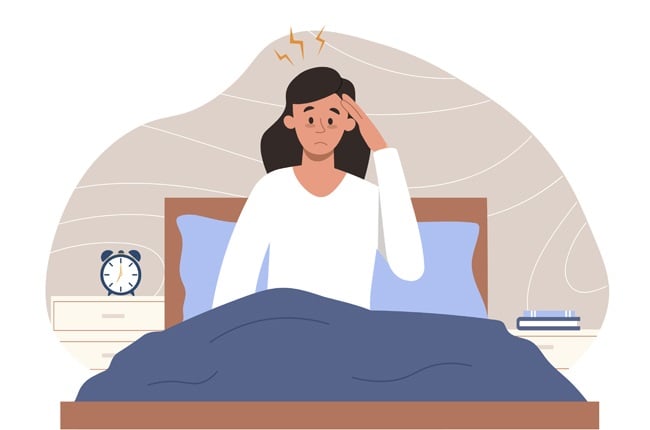
- You know that feeling when you're about to fall into a deep sleep, then you suddenly feel like you're falling down a cliff and jolt awake?
- This is called a hypnic jerk, otherwise known as a hypnagogic jerk.
- There are many interesting theories around why this happens, but the one that caught my attention was the theory that your brain thinks you're dying and tries to wake you up.
- While they are generally harmless, people should visit the doctor if they experience multiple muscle jerks during the day.
You know that feeling when you're about to fall into a deep sleep, then you suddenly feel like you're falling down a cliff and jolt awake? I usually expect to find myself on the floor when that happens, but instead, when I look around, it seems I haven't moved at all. So, what happened?
Doctors and scientists call this a hypnic jerk, otherwise known as a hypnagogic jerk. It's also referred to as a "sleep start" and can literally startle you out of falling asleep.
There are many interesting theories around why this happens, but the one that caught my attention was the theory that your brain thinks you're dying and tries to wake you up. In other words, your brain misunderstands what's going on and causes your muscles to tense as a way to "catch yourself" before falling down - and that makes your body jerk. So basically, you have a built-in superhero inside of you. Whether it's true or not is anyone's guess, but this is my favourite explanation.
The National Library of Medicine describes hypnic jerks as a natural step in the transition from alertness to sleep mode via the reticular activating system, where some of the nerves of the hands and legs misfire. Complete relaxation of the muscles is interpreted by the brain as falling and in order to prevent this the brain orders the muscle to twitch.
The comforting part is that this is all normal, and you should be able to go back to sleep immediately after a sleep start.
READ MORE | 'Infections, pneumonia and heart attacks': The risks of smoking before surgery
In a CNN article, sleep specialist Dr Raj Dasgupta, an associate professor of clinical medicine at the University of Southern California's Keck School of Medicine, said sleep starts are normal occurrences that can happen to men and women of any age, and are typically nothing to worry about.
"It's estimated that nearly 70% of the population experience sleep starts at some point," he said. "Medically speaking, hypnic jerks are classified as a type of myoclonus, which is a category of rapid, involuntary muscle movements. A classic example of myoclonus is hiccups."
Dasgupta said while they are generally harmless, people should visit the doctor if they experience multiple muscle jerks during the day, bite their tongue during hypnic jerks, or wet the bed.
He added that hypnic jerks can sometimes be confused with seizures.
READ MORE | How does non-surgical vaginal rejuvenation work? A doctor explains
The difference between hypnic jerks and seizures
"While they may seem similar, they have some key differences: Seizures are a serious occurrence that can be a result of an underlying condition.
"Hypnic jerks, on the other hand, are benign phenomena that aren't tied to any health conditions or concerns," he said. "Mainly, they're just annoying, especially if they keep preventing you from falling asleep."
According to the Sleep Advisor, the following tips can help prevent or help reduce hypnic jerks:
Reduce Caffeine intake
If you cannot get through the day without caffeine, make sure that you do so in the morning, and avoid it after midday.
Avoid Alcohol
Alcohol is a depressant, but it also has some qualities of a stimulant, which means it can affect the brain and make it more challenging to fall and stay asleep.
READ MORE | Invisible skin mites called Demodex almost certainly live on your face -- but what about your mascara?
Exercise
There are appropriate times of the day when you should be exercising. If you do it too close to your bedtime, this could easily cause hypnagogic jerks, so try to work out in the morning. If you don't have time for it then, stick to more relaxed workouts later in the evening, like Pilates.
Unplug
Have a bedtime routine. Turn off the TV, forget your phone, put the laptop in the other room, and stay there in the dark. Your mind should quickly adjust to that as a stress-free environment that induces relaxation. This would translate to a deeper, twitch-free state of sleep.




 Publications
Publications
 Partners
Partners












